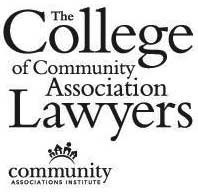
For nearly 20 years, the Community Associations Institute (CAI) has recognized excellence in the practice of community association law through the Falls Church, Virginia-based College of Community Association Lawyers (CCAL). Of the tens of thousands of attorneys practicing community association law across the United States, less than 150 have been granted exclusive membership in the college.
In 1993, the charter class consisted of 20 attorneys acknowledged by their peers as having developed the field of community association law. This burgeoning area of law focused on all areas of the law affecting community associations such as enforcement of an association’s rules and governing documents, litigation, mediation, arbitration and contract renegotiation and renewal.
“CCAL is a designation that lawyers earn by way of having a sufficient number of years of experience in practicing, writing about or teaching Community Association Law,” says CCAL member Ronald L. Perl of Princeton, New Jersey, who teaches a Community Association Law course at Seton Hall Law School. “CCAL members are people that are at the top of the profession of representing community associations. I get calls from other lawyers all the time. Many refer matters to me when they have community association law issues that are beyond their level of competence or expertise.
Experts in the Field
The members of CCAL are considered experts in the field of community association law by their peers. The members distinguish themselves through the contributions to the development of the profession. Their service is demonstrated by a commitment to educate and empower boards and the 60 million residents of the 300,000 community associations across the country. In addition, CCAL provides a forum for the exchange of information among experienced legal professionals working in the community association field arena.
“I do get consulted quite a bit as an expert witness for other lawyers who need an expert in this field,” adds Perl. “When you look for a doctor they have a designation in their area or a specialty and you’ll feel more comfortable going to them. I think the CCAL designation shows that. It identifies people who have achieved competence in this area of the law.”
Since its inception in 1993, the founding principle of the CCAL is to promote high standards of professional and ethical responsibilities in the practice of community association law.
Other goals include developing and educating attorneys working in the field of community association law, facilitating the development of community association educational materials and programming related to legal issues for use by other professionals and homeowners, cooperating with international, national, state and local organizations, government agencies and other groups having an interest in community association law and creating a community of scholars to promote the professional development needs and career goals of CCAL members.
For Members Only
In order to be eligible for membership in the college, an attorney must have a minimum of seven years legal practice with a demonstrated concentration in community association law, five of which immediately must precede the date of application. They must be a member of the Community Associations Institute (CAI) and have attended at least one law seminar within the last five years. They must have demonstrated significant involvement in the provision of legal services to community associations through the attainment of 12 out of a possible 15 points, and finally, community association law has to constitute at least 50 percent of their current practice.
“In order to be a member you have to spend time teaching and writing,” says Perl. “And once you have all of this experience you have to put it together and apply for membership. It can be a lengthy process but it was a much tougher process when I became a member 15 years ago.”
Perl is one of only eleven CCAL members based in New Jersey.
Additional information on becoming a member can be found on CAI’s website http://caionline.org/career/designations or by calling 703-970-9220. For questions regarding the application process contact Michael Hedge, CAI’s Director of Government & Public Affairs at mhedge@caionline.org.
“When I started practicing law 30 years ago, community association law wasn’t even recognized as an area of law,” says Perl. “Times have changed over the past three decades. It went from being recognized as a specialty or an area of concentration to a place where it’s well recognized. There are even law school courses that address the issue. In addition to my course at Seton Hall, I know another professor who teaches a community association law course at Villanova Law School.”
Building Community
CCAL hosts an annual community association law seminar that features emerging trends and legislative issues important to the practice of community association law.
This years’ CCAL seminar was held January 26–28 in Palm Springs, California. Topics included Qualified Mortgages: New Standards, New Challenges; Recalls: The Hidden Pitfalls; When a Director or Manager gets SLAPPed: The Ins and Outs of Strategic Lawsuits Against Public Participation, and The Ethics of Representing Associations During Times of Owner Discontent.
“I’ve attended many of CCALs’ seminars in the last few years,” says Perl. “The program put on by the college is a very high level program for experienced lawyers. Lawyers on my level can benefit from these programs as well as lawyers who are thinking about practicing community association law.”
The College of Community Association Lawyers also hosts an annual trade show and is active in legislative lobbying efforts in Washington, D.C. that affects community associations.
Christy Smith-Sloman is a staff writer at The New Jersey Cooperator and other publications.



Leave a Comment